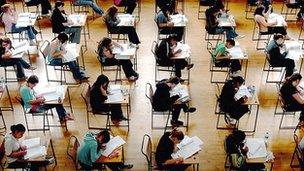Ofqual 'ordered late changes to GCSE English grade boundaries'
- Published

GCSE grades dropped for the first time this year in 24 years
England's exams watchdog told a board to change English GCSE grade boundaries against its will two weeks before this summer's results, it has emerged.
Letters leaked to the Times Educational Supplement show Ofqual ordered exam board Edexcel to make changes beyond what "might normally be required".
Heads say thousands of pupils missed out on an all-important grade C this June after the alterations.
Ofqual says it acted properly and has a duty to maintain standards.
Head teachers, teachers' leaders and pupils have complained that those who sat the exam in January this year were treated more leniently than those who sat it in June.
Ofqual has already ruled that the June grade boundaries were set at the right level, but has acknowledged there was a problem with the January boundaries. It refused to order exam boards to regrade this year's exams.
The letters obtained by the Times Educational Supplement (TES) reveal the degree to which pressure was put on one of England's largest exam boards, Edexcel, to guard against grade inflation this year.
They have been published on the specialist newspaper's website as MPs on the Commons education committee prepare to question Ofqual chief executive Glenys Stacey about the issue, as well as head teachers' leaders.
The letters show that once all GCSE papers were in, a significantly larger number of candidates than expected - some 8% more - had achieved a grade C.
Ofqual's director of standards and research, Dennis Opposs, wrote to Edexcel on 7 August, urging examiners to act quickly and produce results that were "closer to the predictions".
"This may require you to move grade boundary marks further than might normally be required," he wrote.
But Edexcel responded on 8 August, setting out why it believed it had already altered the grade boundary sufficiently and set it correctly.
'Reservations'
"We believe this to be compelling evidence that our award is a fair award and we do not believe a further revision of our grade boundaries is justified," Edexcel said in the letter.
Nonetheless, it added, if Ofqual insisted on a further alteration, the board could raise the minimum requirement for a C grade to 65 marks out of 96 - 10 marks higher than had been the case in January.
The next day, Mr Opposs replied saying that Ofqual expected Edexcel to produce results that did not vary by more than 1% from the prediction.
"So it is not that we must ask, but that you must make sure that the grades are comparable," he wrote, attaching a copy of the regulations by which the exam board is governed.
After the letters came to light on Tuesday, Edexcel said: "Where the grade boundaries were positioned for GCSE English was clearly a matter of extensive discussion this year between exam boards and the regulator.
"As this correspondence shows, Edexcel made certain reservations clear to Ofqual, in the interests of maintaining standards. Our final award, which we believe was fair to all learners, followed specific requests from Ofqual to help them to do that on a national basis across all exam boards."
An Ofqual spokesman said: "We have made it clear that where exam boards propose results that differ significantly from expectations, we will challenge them and intervene where necessary to make sure standards are correct.
"This is exactly the job Parliament intended the independent regulator to do when it set us up".
A former Ofqual board member, John Townsley, now an academy principal, said although grade boundaries were often tweaked, the regulator's action this year "goes dramatically further".
'Credibility'
He accused Ofqual of failing to regulate the English GCSE in the early part of the course, saying: "The content of these letters is startling and makes absolutely clear that Ofqual itself has been at the centre of this disgraceful episode.
"They have a responsibility as a regulator to make sure that things are done properly and the other is to make sure that things are done fairly."
This had not happened, he said, and called on Ms Stacey to resign.
He added that the pupils who had sat the exam later in the year had done so when there was "insufficient fruit left on the tree for them".
Russell Hobby, general secretary of heads' union the NAHT, said the letters were "deeply troubling" and Ofqual's credibility was "draining away by the day".
Brian Lightman, general secretary of the Association of School and College Leaders, said: "Ofqual's insistence that standards were comparable no longer holds water.
"Thousands of students have been treated unfairly because of flawed implementation of a new qualification."
- Published10 September 2012
- Published7 September 2012
- Published3 September 2012
- Published31 August 2012
- Published23 August 2012